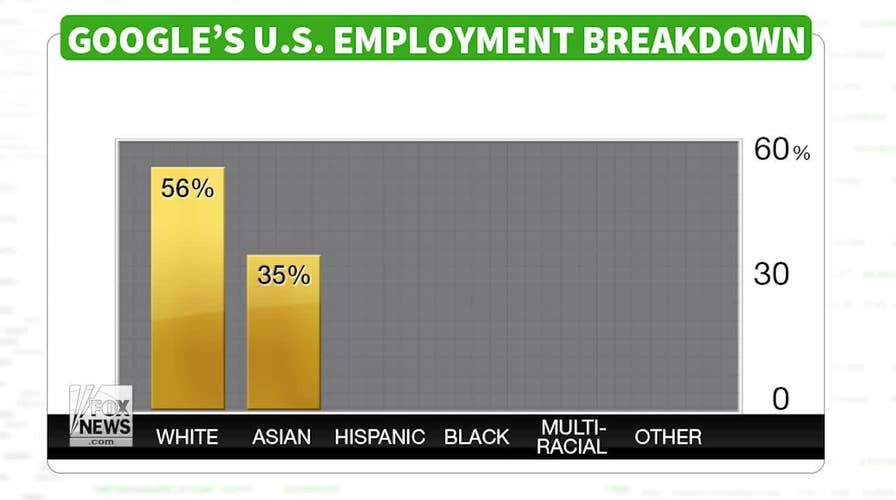Google memo fallout: Silicon Valley diversity in spotlight
A Google engineer released a ten-page memo denouncing the company’s diversity initiatives. How does Google’s workforce makeup compare with other tech giants like Apple and Facebook? Here’s a breakdown
Google engineer James Damore claimed in his now-infamous memo on diversity in the workplace – citing graphs and exhibits of evolutionary psychology – that women in essence are less apt to succeed in the Google tech industry than their male counterparts. Then Google fired him for perpetuating “harmful gender stereotypes.”
But Damore didn’t just become an overnight symbol of what some consider to be misogyny. He became a martyr for men’s rights in corporate America and, according to his supporters, amplifies the growing problem that a company can fire an employee for advocating point of view that may not be politically correct, even if using scientific research.
And other tech entrepreneurs have suggested that even Charles Darwin would be fired from Google for his views on the sexes.
“We are in an age when free speech is being threatened by corporations. Those corporations will double down on efforts to silence political and social dissent,” Paul Elam, activist and founder of A Voice For Men, told Fox News. “James’ memo was scientifically sound. There are differences in the aptitudes, interests and life choices of men and women. The tendency in workplaces is to view the open discussion of those facts as ‘stereotyping.’”
Indeed, Google’s move last month not only ignited nationwide debate over what constitutes a harmful stereotype, but also raised the heated question of whether corporate speech codes have become so stifling that they suppress even the consideration of empirical evidence on gender differences in the workplace.
“The bulk of scientific research on biological and socially constructed sex differences consistently demonstrates profound but complementary differences between men and women. It should be an obvious statement that women tend to perform differently in the corporate environment than men – empirically, women possess different cognitive, relational, emotional and organizational skills,” asserted Chicago-area licensed clinical psychologist Dathan Paterno. “But speaking to the empirical data on sex differences can be treacherous, as the modern corporate milieu encourages a subjective interpretation as inferior, rather than the more benign, objective meaning.”

James Damore, the engineer who was controversially fired from Google for penning the infamous "memo" on gender differences in the tech world.
More and more men specifically in the corporate tech arena are said to be joining various “men’s rights” groups to defend their stances of male-female differences, according to the New York Times, and several men in Silicon Valley have even filed employment discrimination lawsuits.
“Because speech codes effectively suppress speech – implying there is ‘wrong speech’ and ‘correct speech,’ these codes force ignorance of empirical evidence and ironically prevent a robust appreciation of uniqueness and diversity,” Paterno noted.
Speech codes, many argue, have lost their initial intention, which was to limit hateful and slanderous rhetoric, and have ventured into the murky and confining realm of denying the right to free speech. But the reality is, there is no legal right to free speech in corporate America and Google has its defenders.
Mark Lipton, author of “Mean Men: Perversion of America’s Self-Made Man,” a professor of management at The New School in New York and a consultant to several high-level CEOs, contends that while the “empirical research is solid and does show some ‘thematic’ differences between men and women in the workplace,” the data points are too often misrepresented by those who imply all men act one way and all women another.
“We see women executives who act more like men than other women. And we see males who thoroughly break the stereotype of male executives by exhibiting subtle yet clear female traits,” he explained. “So the data is sound but the generalizations one can make at the individual level: ‘you’re a woman so I know you are going to act this way,’ is invalid.”
And despite the outpouring of support Damore has received in bringing to light gender issues and speech codes in America’s corporate culture, Lipton insisted Google made the right retaliatory move.
“The author of the memo twisted some scientific findings to suit his needs. The tone of the piece did not encourage discussion or dialogue between men and women, it served to only divide them further,” he claimed. “There is no right to free speech in corporations.”

Sydney, Australia - September 6, 2011: Close up of an Apple Ipad and on a desk showing the Google search engine home screen. There is also a keyboard and some documents on the desk, the documents show charts and graphs. This scene depicts ipad in a working environment. (Courtney Keating)
SILICON VALLEY SEES RISE OF VOCAL MEN'S RIGHT MOVEMENT AMID PUSH FOR GENDER PARITY
Troy Slaten, a partner at California-based employment and criminal defense firm Floyd, Skeren and Kelly, concurred that there is no such thing as “free speech” in the private sector, and the First Amendment is inapplicable to nongovernmental actors.
“A company is free to hire and fire based on speech from its employees that it likes or dislikes, just as we saw in the Google ‘memo.’ Every human resources department is freaked out about a lawsuit based on an alleged ‘hostile work environment’ that, win or lose, can cost hundreds of thousands in litigation costs,” he said. “Anything can cause an ‘issue’ in the workplace because anyone can be sued about anything at any time. This has caused companies to crack down in lots of areas.”
On that note, employees are not just subject to restrictive on-the-job speech codes these days, but in all facets of their lives, often unrelated to their work – with social media posts and social settings becoming increasingly under scrutiny from employers. Even the American Bar Association last year adopted a new provision in its Model Rules of Professional Conduct, meaning that any conduct related to the practice of law, which includes interacting anywhere with coworkers, clients or personnel, could render them subject to a bar complaint if their views or actions are considered offensive by another.
While public workers and some states offer a little legal protection from being fired for political and personal views, most in America’s workforce aren’t offered such protections.
In addition to Damore, two male gaming developers were axed from their jobs after a female tweeted a photograph of them to “public shame” what she considered to be “sexist” jokes about “big dongles,” several people were reprimanded or fired for mocking the Women’s March this year – including Paterno who was ordered to step down from his school board position for ridiculing the majority of “vagina screechers” participating in the protest for likely not having voted.
Even Nobel Prize-winning scientist Tim Hunt was Twitter-vilified before being squeezed out of multiple honorary board positions two years ago, for making a light-hearted luncheon joke about women scientists “crying” in the lab.
And the subjective notion of what offends, as well as the appropriateness of speech codes in discussing gender matters, is likely only to escalate as a hot-button issue in corporate America.
“It has always been difficult to debate or dissent from feminist talking points in and out of the workplace for most people,” Elam added, “as the perception is that disagreement with feminism implies being anti-woman or anti-equal rights. Time will tell whether society responds through free enterprise, creating the demand for viable platforms predicated on freedom of expression.”






















